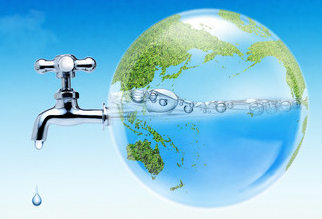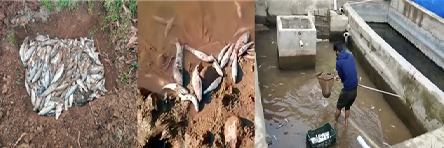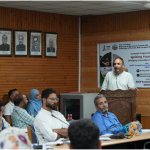Earth is the only planet that has water which is primary source of life without which life is impossible. Water is the basic necessity of every human being. It’s not only humans that require access to clean water. An estimated 780 million people live without clean, accessible drinking water. Drinking contaminated water can lead to a host of life threatening diseases. Water is one of the planet’s most precious resources. 70% of our planet is covered with water and so it is easy to think that there is plenty of water and there will be no scarcity of water. But the reality of availability of water is far away from it. The freshwater that we use for drinking, bathing, irrigation etc. is incredibly rare.
Only 3% of the total water is fresh water and out of which two-thirds is tucked away in frozen glaciers or otherwise unavailable for our use. Water is a fundamental resource necessary for all life on Earth. Humanity would be extinct without it. Water is also essential for human life. We use water to stay hydrated, to cleanse ourselves, to grow, to sustain food, and to maintain the livestock we eat. Not only that, but up to 40% of the population of the entire world lives within 100kms of the coast. It is clear, water is essential to humans. Water is also key to the function of the human body itself. It acts as a nutrient for body cells, a carrier for these nutrients and assists in cellular metabolism. World Water Day observed on 22nd March every year, highlights the value of water, the essential role water plays in our lives, and how we can better safeguard it.
Water scarcity is a major issue that is rising very rapidly in the world. The problem has become so severe that in many counties the groundwater has almost dried up and people have to depend on water supply from other sources. In addition, water is one of the most misused commodities that we still waste. It is the central point of our lives but not the central point of our focus. In the past, people understand the value of water and plan their lives around it. Moreover, many civilizations bloom and lost on account of water. But, today we have knowledge but we still fail to understand the value of water.
Water is the most valuable natural resource as it is essential for human survival and life on earth. However, the availability of freshwater for human consumption is highly under stress because of a variety of factors. Many of the water resources that keep our ecosystems thriving and feed entire human population have become stressed. Rivers, lakes and aquifers are drying up and becoming too polluted to use to due to excessive and improper use. Climate change is also altering patterns of weather and water around the world. As a result, it causes shortages and droughts in some areas and floods in others. As a result, billions of people worldwide lack access to fresh water for at least one month during each year. Inadequate sanitation is also a major problem for billions of people. Due to inadequate sanitation they are exposed to water borne diseases such as cholera and typhoid fever etc.
This crisis of water scarcity is most visible in India as well as in other developing countries. Currently, the annual availability of water is 1123 bcm in India and the demand is around 750 bcm. Water scarcity is the cause of mismanagement and excess population growth of the water resources. Also, it is a man-made issue that continues to rise. Nearly half of the country face severe water scarcity with around 2 lakh people dying every year due to inadequate access to potable water. 70% of India’s water is contaminated, 75% of households do not have drinking water on its premises, 84% of rural households do not have access to piped water, 54% of the country’s groundwater is declining rapidly than it is being replenished. India’s water table is declining in most regions. Also, there is a presence of toxic elements like fluoride, arsenic, mercury, even uranium in our groundwater. Water levels in India’s major reservoirs have fallen to 21% of the average of the last decade. Hundreds of small and seasonal rivers are perishing permanently. Almost all the major perennial rivers remain stagnant.
According to WWF, some 1.1 billion people worldwide lack access to water, and a total of 2.7 billion find water scarcity for at least one month of the year. Natural disasters like tsunamis, climate change, global warming, floods may also cause severe water shortages for the local population since important public infrastructure may be destroyed. The severe natural disaster may entirely collapse the local water supply. Floods may also lead to serious pollution of local water bodies as large amounts of soil are moved, and after floods, local rivers may no longer be suitable for drinking water purposes for a certain period of time. Physical activities like water pollution, increased human consumption, overuse and wastage of water, global rise in freshwater demand, groundwater pollution are also responsible for water scarcity.
Water scarcity has become a serious issue for the Earth. The rapidly increasing world population and water pollution have immensely contributed to the situation. Water scarcity, both natural and of human origin, is the lack of sufficient available water resources to meet the demands within a region. Water is unequally distributed over time and space. Much of it is wasted, polluted and unsustainably managed. There is an urgent need to solve this problem by enhancing water management and preserving wetlands. If the solutions are taken into consideration and appropriately applied, water scarcity may be halted. According to the International Water Management Institute environmental research organization global water stress is increasing, and a third of all people face some sort of water scarcity. Where demand exceeds supply and no effective management operates, there will be conflicts between the various players involved.
Protecting wetlands is another approach to halt the process of water shortage. Wetlands are an important part of the national heritage. They provide human not only natural resources, but also water resources. Therefore, programs and projects need to be established and encouraged to be carried out in order to effectively protect wetlands. Besides that, all citizens can help protect wetlands by supporting wetlands conservation initiatives. There is a need for an efficient system that can manage and distribute the water in urban areas. Also, the government needs to enhance its technology and investment in water treatment. Besides, we should ensure optimization at the planning level. Efficient and effective water management is necessary. Government and the authorities should be responsible for protecting freshwater sources. In addition to that, new laws and regulations about preserving water should be ratified by legislators and helpful methods for sustainable water use should be promoted. Moreover, it is important for countries to expand co-operation with some international organizations in order to take advantage of opportunities to improve water management systems.
“When the well is dry, we know the worth of water”… Benjamin Franklin
(The Author is a regular writer for this newspaper and can be reached at [email protected])








